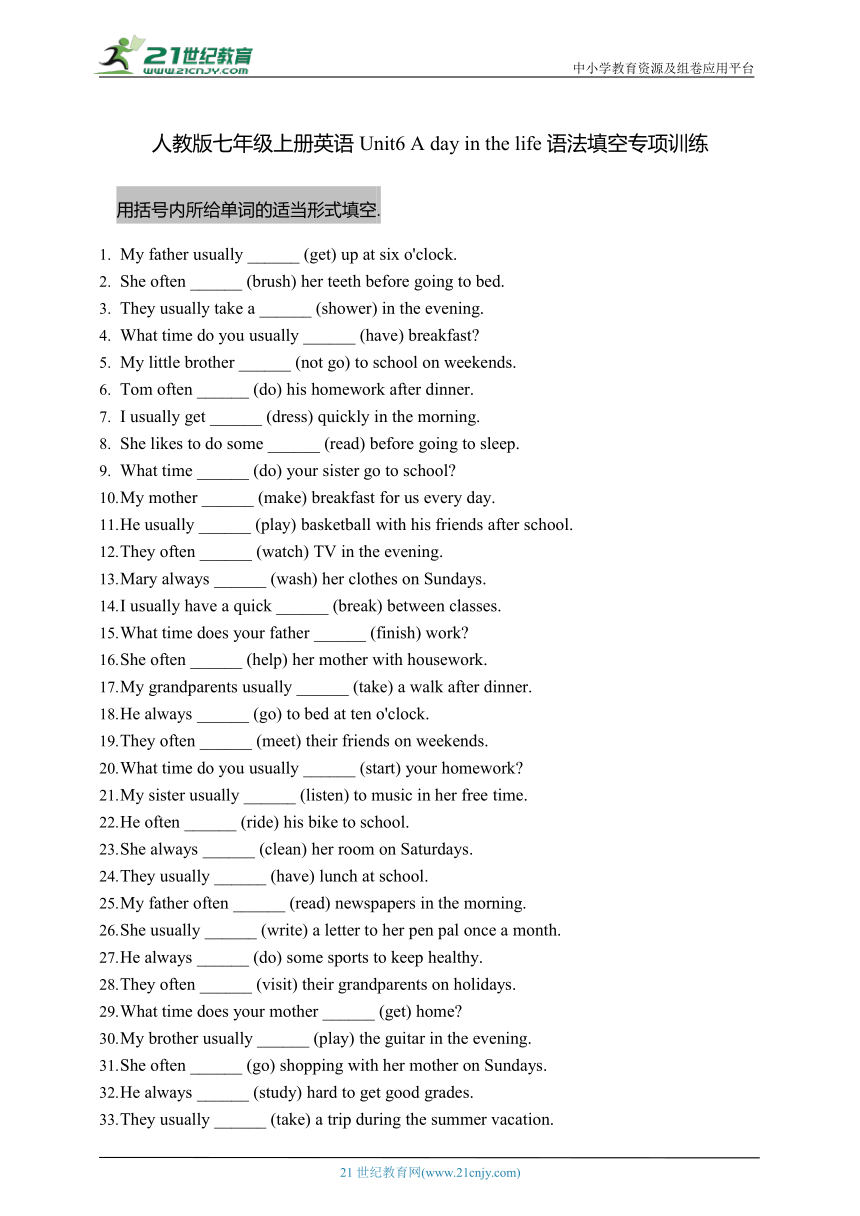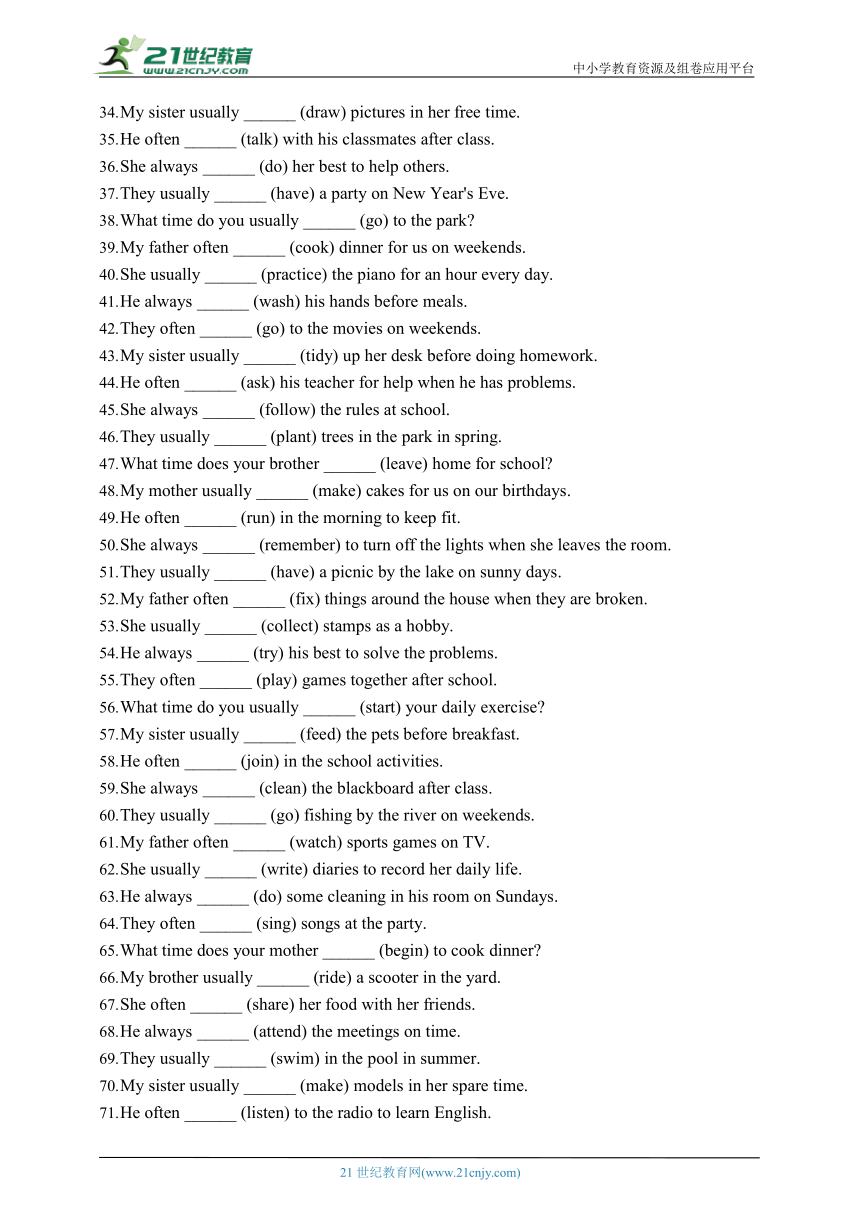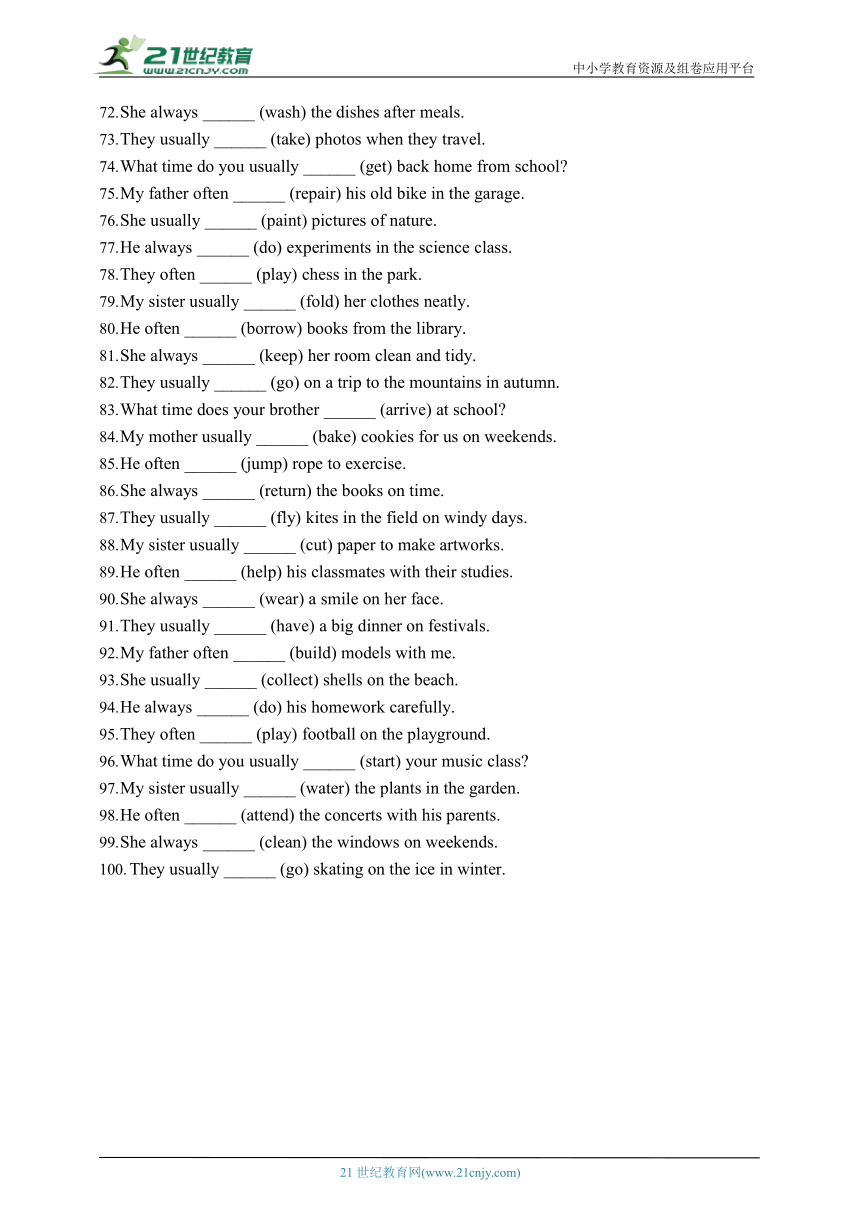Unit6 A day in the life语法填空专项训练(含答案解析)—人教版七年级上册英语
文档属性
| 名称 | Unit6 A day in the life语法填空专项训练(含答案解析)—人教版七年级上册英语 |  | |
| 格式 | docx | ||
| 文件大小 | 49.9KB | ||
| 资源类型 | 试卷 | ||
| 版本资源 | 人教版 | ||
| 科目 | 英语 | ||
| 更新时间 | 2025-08-07 01:14:30 | ||
图片预览



文档简介
中小学教育资源及组卷应用平台
人教版七年级上册英语Unit6 A day in the life语法填空专项训练
用括号内所给单词的适当形式填空.
My father usually ______ (get) up at six o'clock.
She often ______ (brush) her teeth before going to bed.
They usually take a ______ (shower) in the evening.
What time do you usually ______ (have) breakfast
My little brother ______ (not go) to school on weekends.
Tom often ______ (do) his homework after dinner.
I usually get ______ (dress) quickly in the morning.
She likes to do some ______ (read) before going to sleep.
What time ______ (do) your sister go to school
My mother ______ (make) breakfast for us every day.
He usually ______ (play) basketball with his friends after school.
They often ______ (watch) TV in the evening.
Mary always ______ (wash) her clothes on Sundays.
I usually have a quick ______ (break) between classes.
What time does your father ______ (finish) work
She often ______ (help) her mother with housework.
My grandparents usually ______ (take) a walk after dinner.
He always ______ (go) to bed at ten o'clock.
They often ______ (meet) their friends on weekends.
What time do you usually ______ (start) your homework
My sister usually ______ (listen) to music in her free time.
He often ______ (ride) his bike to school.
She always ______ (clean) her room on Saturdays.
They usually ______ (have) lunch at school.
My father often ______ (read) newspapers in the morning.
She usually ______ (write) a letter to her pen pal once a month.
He always ______ (do) some sports to keep healthy.
They often ______ (visit) their grandparents on holidays.
What time does your mother ______ (get) home
My brother usually ______ (play) the guitar in the evening.
She often ______ (go) shopping with her mother on Sundays.
He always ______ (study) hard to get good grades.
They usually ______ (take) a trip during the summer vacation.
My sister usually ______ (draw) pictures in her free time.
He often ______ (talk) with his classmates after class.
She always ______ (do) her best to help others.
They usually ______ (have) a party on New Year's Eve.
What time do you usually ______ (go) to the park
My father often ______ (cook) dinner for us on weekends.
She usually ______ (practice) the piano for an hour every day.
He always ______ (wash) his hands before meals.
They often ______ (go) to the movies on weekends.
My sister usually ______ (tidy) up her desk before doing homework.
He often ______ (ask) his teacher for help when he has problems.
She always ______ (follow) the rules at school.
They usually ______ (plant) trees in the park in spring.
What time does your brother ______ (leave) home for school
My mother usually ______ (make) cakes for us on our birthdays.
He often ______ (run) in the morning to keep fit.
She always ______ (remember) to turn off the lights when she leaves the room.
They usually ______ (have) a picnic by the lake on sunny days.
My father often ______ (fix) things around the house when they are broken.
She usually ______ (collect) stamps as a hobby.
He always ______ (try) his best to solve the problems.
They often ______ (play) games together after school.
What time do you usually ______ (start) your daily exercise
My sister usually ______ (feed) the pets before breakfast.
He often ______ (join) in the school activities.
She always ______ (clean) the blackboard after class.
They usually ______ (go) fishing by the river on weekends.
My father often ______ (watch) sports games on TV.
She usually ______ (write) diaries to record her daily life.
He always ______ (do) some cleaning in his room on Sundays.
They often ______ (sing) songs at the party.
What time does your mother ______ (begin) to cook dinner
My brother usually ______ (ride) a scooter in the yard.
She often ______ (share) her food with her friends.
He always ______ (attend) the meetings on time.
They usually ______ (swim) in the pool in summer.
My sister usually ______ (make) models in her spare time.
He often ______ (listen) to the radio to learn English.
She always ______ (wash) the dishes after meals.
They usually ______ (take) photos when they travel.
What time do you usually ______ (get) back home from school
My father often ______ (repair) his old bike in the garage.
She usually ______ (paint) pictures of nature.
He always ______ (do) experiments in the science class.
They often ______ (play) chess in the park.
My sister usually ______ (fold) her clothes neatly.
He often ______ (borrow) books from the library.
She always ______ (keep) her room clean and tidy.
They usually ______ (go) on a trip to the mountains in autumn.
What time does your brother ______ (arrive) at school
My mother usually ______ (bake) cookies for us on weekends.
He often ______ (jump) rope to exercise.
She always ______ (return) the books on time.
They usually ______ (fly) kites in the field on windy days.
My sister usually ______ (cut) paper to make artworks.
He often ______ (help) his classmates with their studies.
She always ______ (wear) a smile on her face.
They usually ______ (have) a big dinner on festivals.
My father often ______ (build) models with me.
She usually ______ (collect) shells on the beach.
He always ______ (do) his homework carefully.
They often ______ (play) football on the playground.
What time do you usually ______ (start) your music class
My sister usually ______ (water) the plants in the garden.
He often ______ (attend) the concerts with his parents.
She always ______ (clean) the windows on weekends.
They usually ______ (go) skating on the ice in winter.
人教版七年级上册Unit6语法填空答案解析
用括号内所给单词的适当形式填空.
gets解析:主语“My father”是第三人称单数,且句中有“usually”表示一般现在时,动词“get”需用第三人称单数形式“gets”。
brushes解析:主语“She”是第三人称单数,“often”提示一般现在时,“brush”的第三人称单数形式为“brushes”(以“sh”结尾加“es”)。
shower解析:固定短语“take a shower”(洗澡),此处用名词“shower”的原形。
have解析:句中有助动词“do”,其后动词用原形,故填“have”。
doesn't go解析:主语“My little brother”是第三人称单数,否定句需用助动词“doesn't”,其后动词“go”用原形。
does解析:主语“Tom”是第三人称单数,“often”提示一般现在时,“do”的第三人称单数形式为“does”。
dressed解析:固定短语“get dressed”(穿好衣服),此处用过去分词“dressed”。
reading解析:固定短语“do some reading”(阅读),“read”需用动名词形式“reading”。
does解析:主语“your sister”是第三人称单数,疑问句中助动词用“does”。
makes解析:主语“My mother”是第三人称单数,“every day”提示一般现在时,“make”的第三人称单数形式为“makes”。
plays解析:主语“He”是第三人称单数,“usually”提示一般现在时,“play”的第三人称单数形式为“plays”。
watch解析:主语“They”是复数,“often”提示一般现在时,动词用原形“watch”。
washes解析:主语“Mary”是第三人称单数,“always”提示一般现在时,“wash”的第三人称单数形式为“washes”(以“sh”结尾加“es”)。
break解析:固定短语“have a quick break”(快速休息),此处用名词“break”的原形。
finish解析:句中有助动词“does”,其后动词用原形,故填“finish”。
helps解析:主语“She”是第三人称单数,“often”提示一般现在时,“help”的第三人称单数形式为“helps”。
take解析:主语“My grandparents”是复数,“usually”提示一般现在时,动词用原形“take”。
goes解析:主语“He”是第三人称单数,“always”提示一般现在时,“go”的第三人称单数形式为“goes”。
meet解析:主语“They”是复数,“often”提示一般现在时,动词用原形“meet”。
start解析:句中有助动词“do”,其后动词用原形,故填“start”。
listens解析:主语“My sister”是第三人称单数,“usually”提示一般现在时,“listen”的第三人称单数形式为“listens”。
rides解析:主语“He”是第三人称单数,“often”提示一般现在时,“ride”的第三人称单数形式为“rides”。
cleans解析:主语“She”是第三人称单数,“always”提示一般现在时,“clean”的第三人称单数形式为“cleans”。
have解析:主语“They”是复数,“usually”提示一般现在时,动词用原形“have”。
reads解析:主语“My father”是第三人称单数,“often”提示一般现在时,“read”的第三人称单数形式为“reads”。
writes解析:主语“She”是第三人称单数,“usually”提示一般现在时,“write”的第三人称单数形式为“writes”。
does解析:主语“He”是第三人称单数,“always”提示一般现在时,“do”的第三人称单数形式为“does”。
visit解析:主语“They”是复数,“often”提示一般现在时,动词用原形“visit”。
get解析:句中有助动词“does”,其后动词用原形,故填“get”。
plays解析:主语“My brother”是第三人称单数,“usually”提示一般现在时,“play”的第三人称单数形式为“plays”。
goes解析:主语“She”是第三人称单数,“often”提示一般现在时,“go”的第三人称单数形式为“goes”。
studies解析:主语“He”是第三人称单数,“always”提示一般现在时,“study”的第三人称单数形式为“studies”(以“辅音+y”结尾,变“y”为“i”加“es”)。
take解析:主语“They”是复数,“usually”提示一般现在时,动词用原形“take”。
draws解析:主语“My sister”是第三人称单数,“usually”提示一般现在时,“draw”的第三人称单数形式为“draws”。
talks解析:主语“He”是第三人称单数,“often”提示一般现在时,“talk”的第三人称单数形式为“talks”。
does解析:主语“She”是第三人称单数,“always”提示一般现在时,“do”的第三人称单数形式为“does”。
have解析:主语“They”是复数,“usually”提示一般现在时,动词用原形“have”。
go解析:句中有助动词“do”,其后动词用原形,故填“go”。
cooks解析:主语“My father”是第三人称单数,“often”提示一般现在时,“cook”的第三人称单数形式为“cooks”。
practices解析:主语“She”是第三人称单数,“usually”提示一般现在时,“practice”的第三人称单数形式为“practices”。
washes解析:主语“He”是第三人称单数,“always”提示一般现在时,“wash”的第三人称单数形式为“washes”。
go解析:主语“They”是复数,“often”提示一般现在时,动词用原形“go”。
tidies解析:主语“My sister”是第三人称单数,“usually”提示一般现在时,“tidy”的第三人称单数形式为“tidies”(以“辅音+y”结尾,变“y”为“i”加“es”)。
asks解析:主语“He”是第三人称单数,“often”提示一般现在时,“ask”的第三人称单数形式为“asks”。
follows解析:主语“She”是第三人称单数,“always”提示一般现在时,“follow”的第三人称单数形式为“follows”。
plant解析:主语“They”是复数,“usually”提示一般现在时,动词用原形“plant”。
leave解析:句中有助动词“does”,其后动词用原形,故填“leave”。
makes解析:主语“My mother”是第三人称单数,“usually”提示一般现在时,“make”的第三人称单数形式为“makes”。
runs解析:主语“He”是第三人称单数,“often”提示一般现在时,“run”的第三人称单数形式为“runs”。
remembers解析:主语“She”是第三人称单数,“always”提示一般现在时,“remember”的第三人称单数形式为“remembers”。
have解析:主语“They”是复数,“usually”提示一般现在时,动词用原形“have”。
fixes解析:主语“My father”是第三人称单数,“often”提示一般现在时,“fix”的第三人称单数形式为“fixes”。
collects解析:主语“She”是第三人称单数,“usually”提示一般现在时,“collect”的第三人称单数形式为“collects”。
tries解析:主语“He”是第三人称单数,“always”提示一般现在时,“try”的第三人称单数形式为“tries”(以“辅音+y”结尾,变“y”为“i”加“es”)。
play解析:主语“They”是复数,“often”提示一般现在时,动词用原形“play”。
start解析:句中有助动词“do”,其后动词用原形,故填“start”。
feeds解析:主语“My sister”是第三人称单数,“usually”提示一般现在时,“feed”的第三人称单数形式为“feeds”。
joins解析:主语“He”是第三人称单数,“often”提示一般现在时,“join”的第三人称单数形式为“joins”。
cleans解析:主语“She”是第三人称单数,“always”提示一般现在时,“clean”的第三人称单数形式为“cleans”。
go解析:主语“They”是复数,“usually”提示一般现在时,动词用原形“go”。
watches解析:主语“My father”是第三人称单数,“often”提示一般现在时,“watch”的第三人称单数形式为“watches”(以“ch”结尾加“es”)。
writes解析:主语“She”是第三人称单数,“usually”提示一般现在时,“write”的第三人称单数形式为“writes”。
does解析:主语“He”是第三人称单数,“always”提示一般现在时,“do”的第三人称单数形式为“does”。
sing解析:主语“They”是复数,“often”提示一般现在时,动词用原形“sing”。
begin解析:句中有助动词“does”,其后动词用原形,故填“begin”。
rides解析:主语“My brother”是第三人称单数,“usually”提示一般现在时,“ride”的第三人称单数形式为“rides”。
shares解析:主语“She”是第三人称单数,“often”提示一般现在时,“share”的第三人称单数形式为“shares”。
attends解析:主语“He”是第三人称单数,“always”提示一般现在时,“attend”的第三人称单数形式为“attends”。
swim解析:主语“They”是复数,“usually”提示一般现在时,动词用原形“swim”。
makes解析:主语“My sister”是第三人称单数,“usually”提示一般现在时,“make”的第三人称单数形式为“makes”。
listens解析:主语“He”是第三人称单数,“often”提示一般现在时,“listen”的第三人称单数形式为“listens”。
washes解析:主语“She”是第三人称单数,“always”提示一般现在时,“wash”的第三人称单数形式为“washes”。
take解析:主语“They”是复数,“usually”提示一般现在时,动词用原形“take”。
get解析:句中有助动词“do”,其后动词用原形,故填“get”。
repairs解析:主语“My father”是第三人称单数,“often”提示一般现在时,“repair”的第三人称单数形式为“repairs”。
paints解析:主语“She”是第三人称单数,“usually”提示一般现在时,“paint”的第三人称单数形式为“paints”。
does解析:主语“He”是第三人称单数,“always”提示一般现在时,“do”的第三人称单数形式为“does”。
play解析:主语“They”是复数,“often”提示一般现在时,动词用原形“play”。
folds解析:主语“My sister”是第三人称单数,“usually”提示一般现在时,“fold”的第三人称单数形式为“folds”。
borrows解析:主语“He”是第三人称单数,“often”提示一般现在时,“borrow”的第三人称单数形式为“borrows”。
keeps解析:主语“She”是第三人称单数,“always”提示一般现在时,“keep”的第三人称单数形式为“keeps”。
go解析:主语“They”是复数,“usually”提示一般现在时,动词用原形“go”。
arrive解析:句中有助动词“does”,其后动词用原形,故填“arrive”。
bakes解析:主语“My mother”是第三人称单数,“usually”提示一般现在时,“bake”的第三人称单数形式为“bakes”。
jumps解析:主语“He”是第三人称单数,“often”提示一般现在时,“jump”的第三人称单数形式为“jumps”。
returns解析:主语“She”是第三人称单数,“always”提示一般现在时,“return”的第三人称单数形式为“returns”。
fly解析:主语“They”是复数,“usually”提示一般现在时,动词用原形“fly”。
cuts解析:主语“My sister”是第三人称单数,“usually”提示一般现在时,“cut”的第三人称单数形式为“cuts”。
helps解析:主语“He”是第三人称单数,“often”提示一般现在时,“help”的第三人称单数形式为“helps”。
wears解析:主语“She”是第三人称单数,“always”提示一般现在时,“wear”的第三人称单数形式为“wears”。
have解析:主语“They”是复数,“usually”提示一般现在时,动词用原形“have”。
builds解析:主语“My father”是第三人称单数,“often”提示一般现在时,“build”的第三人称单数形式为“builds”。
collects解析:主语“She”是第三人称单数,“usually”提示一般现在时,“collect”的第三人称单数形式为“collects”。
does解析:主语“He”是第三人称单数,“always”提示一般现在时,“do”的第三人称单数形式为“does”。
play解析:主语“They”是复数,“often”提示一般现在时,动词用原形“play”。
start解析:句中有助动词“do”,其后动词用原形,故填“start”。
waters解析:主语“My sister”是第三人称单数,“usually”提示一般现在时,“water”的第三人称单数形式为“waters”。
attends解析:主语“He”是第三人称单数,“often”提示一般现在时,“attend”的第三人称单数形式为“attends”。
cleans解析:主语“She”是第三人称单数,“always”提示一般现在时,“clean”的第三人称单数形式为“cleans”。
go解析:主语“They”是复数,“usually”提示一般现在时,动词用原形“go”。
21世纪教育网 www.21cnjy.com 精品试卷·第 2 页 (共 2 页)
21世纪教育网(www.21cnjy.com)
人教版七年级上册英语Unit6 A day in the life语法填空专项训练
用括号内所给单词的适当形式填空.
My father usually ______ (get) up at six o'clock.
She often ______ (brush) her teeth before going to bed.
They usually take a ______ (shower) in the evening.
What time do you usually ______ (have) breakfast
My little brother ______ (not go) to school on weekends.
Tom often ______ (do) his homework after dinner.
I usually get ______ (dress) quickly in the morning.
She likes to do some ______ (read) before going to sleep.
What time ______ (do) your sister go to school
My mother ______ (make) breakfast for us every day.
He usually ______ (play) basketball with his friends after school.
They often ______ (watch) TV in the evening.
Mary always ______ (wash) her clothes on Sundays.
I usually have a quick ______ (break) between classes.
What time does your father ______ (finish) work
She often ______ (help) her mother with housework.
My grandparents usually ______ (take) a walk after dinner.
He always ______ (go) to bed at ten o'clock.
They often ______ (meet) their friends on weekends.
What time do you usually ______ (start) your homework
My sister usually ______ (listen) to music in her free time.
He often ______ (ride) his bike to school.
She always ______ (clean) her room on Saturdays.
They usually ______ (have) lunch at school.
My father often ______ (read) newspapers in the morning.
She usually ______ (write) a letter to her pen pal once a month.
He always ______ (do) some sports to keep healthy.
They often ______ (visit) their grandparents on holidays.
What time does your mother ______ (get) home
My brother usually ______ (play) the guitar in the evening.
She often ______ (go) shopping with her mother on Sundays.
He always ______ (study) hard to get good grades.
They usually ______ (take) a trip during the summer vacation.
My sister usually ______ (draw) pictures in her free time.
He often ______ (talk) with his classmates after class.
She always ______ (do) her best to help others.
They usually ______ (have) a party on New Year's Eve.
What time do you usually ______ (go) to the park
My father often ______ (cook) dinner for us on weekends.
She usually ______ (practice) the piano for an hour every day.
He always ______ (wash) his hands before meals.
They often ______ (go) to the movies on weekends.
My sister usually ______ (tidy) up her desk before doing homework.
He often ______ (ask) his teacher for help when he has problems.
She always ______ (follow) the rules at school.
They usually ______ (plant) trees in the park in spring.
What time does your brother ______ (leave) home for school
My mother usually ______ (make) cakes for us on our birthdays.
He often ______ (run) in the morning to keep fit.
She always ______ (remember) to turn off the lights when she leaves the room.
They usually ______ (have) a picnic by the lake on sunny days.
My father often ______ (fix) things around the house when they are broken.
She usually ______ (collect) stamps as a hobby.
He always ______ (try) his best to solve the problems.
They often ______ (play) games together after school.
What time do you usually ______ (start) your daily exercise
My sister usually ______ (feed) the pets before breakfast.
He often ______ (join) in the school activities.
She always ______ (clean) the blackboard after class.
They usually ______ (go) fishing by the river on weekends.
My father often ______ (watch) sports games on TV.
She usually ______ (write) diaries to record her daily life.
He always ______ (do) some cleaning in his room on Sundays.
They often ______ (sing) songs at the party.
What time does your mother ______ (begin) to cook dinner
My brother usually ______ (ride) a scooter in the yard.
She often ______ (share) her food with her friends.
He always ______ (attend) the meetings on time.
They usually ______ (swim) in the pool in summer.
My sister usually ______ (make) models in her spare time.
He often ______ (listen) to the radio to learn English.
She always ______ (wash) the dishes after meals.
They usually ______ (take) photos when they travel.
What time do you usually ______ (get) back home from school
My father often ______ (repair) his old bike in the garage.
She usually ______ (paint) pictures of nature.
He always ______ (do) experiments in the science class.
They often ______ (play) chess in the park.
My sister usually ______ (fold) her clothes neatly.
He often ______ (borrow) books from the library.
She always ______ (keep) her room clean and tidy.
They usually ______ (go) on a trip to the mountains in autumn.
What time does your brother ______ (arrive) at school
My mother usually ______ (bake) cookies for us on weekends.
He often ______ (jump) rope to exercise.
She always ______ (return) the books on time.
They usually ______ (fly) kites in the field on windy days.
My sister usually ______ (cut) paper to make artworks.
He often ______ (help) his classmates with their studies.
She always ______ (wear) a smile on her face.
They usually ______ (have) a big dinner on festivals.
My father often ______ (build) models with me.
She usually ______ (collect) shells on the beach.
He always ______ (do) his homework carefully.
They often ______ (play) football on the playground.
What time do you usually ______ (start) your music class
My sister usually ______ (water) the plants in the garden.
He often ______ (attend) the concerts with his parents.
She always ______ (clean) the windows on weekends.
They usually ______ (go) skating on the ice in winter.
人教版七年级上册Unit6语法填空答案解析
用括号内所给单词的适当形式填空.
gets解析:主语“My father”是第三人称单数,且句中有“usually”表示一般现在时,动词“get”需用第三人称单数形式“gets”。
brushes解析:主语“She”是第三人称单数,“often”提示一般现在时,“brush”的第三人称单数形式为“brushes”(以“sh”结尾加“es”)。
shower解析:固定短语“take a shower”(洗澡),此处用名词“shower”的原形。
have解析:句中有助动词“do”,其后动词用原形,故填“have”。
doesn't go解析:主语“My little brother”是第三人称单数,否定句需用助动词“doesn't”,其后动词“go”用原形。
does解析:主语“Tom”是第三人称单数,“often”提示一般现在时,“do”的第三人称单数形式为“does”。
dressed解析:固定短语“get dressed”(穿好衣服),此处用过去分词“dressed”。
reading解析:固定短语“do some reading”(阅读),“read”需用动名词形式“reading”。
does解析:主语“your sister”是第三人称单数,疑问句中助动词用“does”。
makes解析:主语“My mother”是第三人称单数,“every day”提示一般现在时,“make”的第三人称单数形式为“makes”。
plays解析:主语“He”是第三人称单数,“usually”提示一般现在时,“play”的第三人称单数形式为“plays”。
watch解析:主语“They”是复数,“often”提示一般现在时,动词用原形“watch”。
washes解析:主语“Mary”是第三人称单数,“always”提示一般现在时,“wash”的第三人称单数形式为“washes”(以“sh”结尾加“es”)。
break解析:固定短语“have a quick break”(快速休息),此处用名词“break”的原形。
finish解析:句中有助动词“does”,其后动词用原形,故填“finish”。
helps解析:主语“She”是第三人称单数,“often”提示一般现在时,“help”的第三人称单数形式为“helps”。
take解析:主语“My grandparents”是复数,“usually”提示一般现在时,动词用原形“take”。
goes解析:主语“He”是第三人称单数,“always”提示一般现在时,“go”的第三人称单数形式为“goes”。
meet解析:主语“They”是复数,“often”提示一般现在时,动词用原形“meet”。
start解析:句中有助动词“do”,其后动词用原形,故填“start”。
listens解析:主语“My sister”是第三人称单数,“usually”提示一般现在时,“listen”的第三人称单数形式为“listens”。
rides解析:主语“He”是第三人称单数,“often”提示一般现在时,“ride”的第三人称单数形式为“rides”。
cleans解析:主语“She”是第三人称单数,“always”提示一般现在时,“clean”的第三人称单数形式为“cleans”。
have解析:主语“They”是复数,“usually”提示一般现在时,动词用原形“have”。
reads解析:主语“My father”是第三人称单数,“often”提示一般现在时,“read”的第三人称单数形式为“reads”。
writes解析:主语“She”是第三人称单数,“usually”提示一般现在时,“write”的第三人称单数形式为“writes”。
does解析:主语“He”是第三人称单数,“always”提示一般现在时,“do”的第三人称单数形式为“does”。
visit解析:主语“They”是复数,“often”提示一般现在时,动词用原形“visit”。
get解析:句中有助动词“does”,其后动词用原形,故填“get”。
plays解析:主语“My brother”是第三人称单数,“usually”提示一般现在时,“play”的第三人称单数形式为“plays”。
goes解析:主语“She”是第三人称单数,“often”提示一般现在时,“go”的第三人称单数形式为“goes”。
studies解析:主语“He”是第三人称单数,“always”提示一般现在时,“study”的第三人称单数形式为“studies”(以“辅音+y”结尾,变“y”为“i”加“es”)。
take解析:主语“They”是复数,“usually”提示一般现在时,动词用原形“take”。
draws解析:主语“My sister”是第三人称单数,“usually”提示一般现在时,“draw”的第三人称单数形式为“draws”。
talks解析:主语“He”是第三人称单数,“often”提示一般现在时,“talk”的第三人称单数形式为“talks”。
does解析:主语“She”是第三人称单数,“always”提示一般现在时,“do”的第三人称单数形式为“does”。
have解析:主语“They”是复数,“usually”提示一般现在时,动词用原形“have”。
go解析:句中有助动词“do”,其后动词用原形,故填“go”。
cooks解析:主语“My father”是第三人称单数,“often”提示一般现在时,“cook”的第三人称单数形式为“cooks”。
practices解析:主语“She”是第三人称单数,“usually”提示一般现在时,“practice”的第三人称单数形式为“practices”。
washes解析:主语“He”是第三人称单数,“always”提示一般现在时,“wash”的第三人称单数形式为“washes”。
go解析:主语“They”是复数,“often”提示一般现在时,动词用原形“go”。
tidies解析:主语“My sister”是第三人称单数,“usually”提示一般现在时,“tidy”的第三人称单数形式为“tidies”(以“辅音+y”结尾,变“y”为“i”加“es”)。
asks解析:主语“He”是第三人称单数,“often”提示一般现在时,“ask”的第三人称单数形式为“asks”。
follows解析:主语“She”是第三人称单数,“always”提示一般现在时,“follow”的第三人称单数形式为“follows”。
plant解析:主语“They”是复数,“usually”提示一般现在时,动词用原形“plant”。
leave解析:句中有助动词“does”,其后动词用原形,故填“leave”。
makes解析:主语“My mother”是第三人称单数,“usually”提示一般现在时,“make”的第三人称单数形式为“makes”。
runs解析:主语“He”是第三人称单数,“often”提示一般现在时,“run”的第三人称单数形式为“runs”。
remembers解析:主语“She”是第三人称单数,“always”提示一般现在时,“remember”的第三人称单数形式为“remembers”。
have解析:主语“They”是复数,“usually”提示一般现在时,动词用原形“have”。
fixes解析:主语“My father”是第三人称单数,“often”提示一般现在时,“fix”的第三人称单数形式为“fixes”。
collects解析:主语“She”是第三人称单数,“usually”提示一般现在时,“collect”的第三人称单数形式为“collects”。
tries解析:主语“He”是第三人称单数,“always”提示一般现在时,“try”的第三人称单数形式为“tries”(以“辅音+y”结尾,变“y”为“i”加“es”)。
play解析:主语“They”是复数,“often”提示一般现在时,动词用原形“play”。
start解析:句中有助动词“do”,其后动词用原形,故填“start”。
feeds解析:主语“My sister”是第三人称单数,“usually”提示一般现在时,“feed”的第三人称单数形式为“feeds”。
joins解析:主语“He”是第三人称单数,“often”提示一般现在时,“join”的第三人称单数形式为“joins”。
cleans解析:主语“She”是第三人称单数,“always”提示一般现在时,“clean”的第三人称单数形式为“cleans”。
go解析:主语“They”是复数,“usually”提示一般现在时,动词用原形“go”。
watches解析:主语“My father”是第三人称单数,“often”提示一般现在时,“watch”的第三人称单数形式为“watches”(以“ch”结尾加“es”)。
writes解析:主语“She”是第三人称单数,“usually”提示一般现在时,“write”的第三人称单数形式为“writes”。
does解析:主语“He”是第三人称单数,“always”提示一般现在时,“do”的第三人称单数形式为“does”。
sing解析:主语“They”是复数,“often”提示一般现在时,动词用原形“sing”。
begin解析:句中有助动词“does”,其后动词用原形,故填“begin”。
rides解析:主语“My brother”是第三人称单数,“usually”提示一般现在时,“ride”的第三人称单数形式为“rides”。
shares解析:主语“She”是第三人称单数,“often”提示一般现在时,“share”的第三人称单数形式为“shares”。
attends解析:主语“He”是第三人称单数,“always”提示一般现在时,“attend”的第三人称单数形式为“attends”。
swim解析:主语“They”是复数,“usually”提示一般现在时,动词用原形“swim”。
makes解析:主语“My sister”是第三人称单数,“usually”提示一般现在时,“make”的第三人称单数形式为“makes”。
listens解析:主语“He”是第三人称单数,“often”提示一般现在时,“listen”的第三人称单数形式为“listens”。
washes解析:主语“She”是第三人称单数,“always”提示一般现在时,“wash”的第三人称单数形式为“washes”。
take解析:主语“They”是复数,“usually”提示一般现在时,动词用原形“take”。
get解析:句中有助动词“do”,其后动词用原形,故填“get”。
repairs解析:主语“My father”是第三人称单数,“often”提示一般现在时,“repair”的第三人称单数形式为“repairs”。
paints解析:主语“She”是第三人称单数,“usually”提示一般现在时,“paint”的第三人称单数形式为“paints”。
does解析:主语“He”是第三人称单数,“always”提示一般现在时,“do”的第三人称单数形式为“does”。
play解析:主语“They”是复数,“often”提示一般现在时,动词用原形“play”。
folds解析:主语“My sister”是第三人称单数,“usually”提示一般现在时,“fold”的第三人称单数形式为“folds”。
borrows解析:主语“He”是第三人称单数,“often”提示一般现在时,“borrow”的第三人称单数形式为“borrows”。
keeps解析:主语“She”是第三人称单数,“always”提示一般现在时,“keep”的第三人称单数形式为“keeps”。
go解析:主语“They”是复数,“usually”提示一般现在时,动词用原形“go”。
arrive解析:句中有助动词“does”,其后动词用原形,故填“arrive”。
bakes解析:主语“My mother”是第三人称单数,“usually”提示一般现在时,“bake”的第三人称单数形式为“bakes”。
jumps解析:主语“He”是第三人称单数,“often”提示一般现在时,“jump”的第三人称单数形式为“jumps”。
returns解析:主语“She”是第三人称单数,“always”提示一般现在时,“return”的第三人称单数形式为“returns”。
fly解析:主语“They”是复数,“usually”提示一般现在时,动词用原形“fly”。
cuts解析:主语“My sister”是第三人称单数,“usually”提示一般现在时,“cut”的第三人称单数形式为“cuts”。
helps解析:主语“He”是第三人称单数,“often”提示一般现在时,“help”的第三人称单数形式为“helps”。
wears解析:主语“She”是第三人称单数,“always”提示一般现在时,“wear”的第三人称单数形式为“wears”。
have解析:主语“They”是复数,“usually”提示一般现在时,动词用原形“have”。
builds解析:主语“My father”是第三人称单数,“often”提示一般现在时,“build”的第三人称单数形式为“builds”。
collects解析:主语“She”是第三人称单数,“usually”提示一般现在时,“collect”的第三人称单数形式为“collects”。
does解析:主语“He”是第三人称单数,“always”提示一般现在时,“do”的第三人称单数形式为“does”。
play解析:主语“They”是复数,“often”提示一般现在时,动词用原形“play”。
start解析:句中有助动词“do”,其后动词用原形,故填“start”。
waters解析:主语“My sister”是第三人称单数,“usually”提示一般现在时,“water”的第三人称单数形式为“waters”。
attends解析:主语“He”是第三人称单数,“often”提示一般现在时,“attend”的第三人称单数形式为“attends”。
cleans解析:主语“She”是第三人称单数,“always”提示一般现在时,“clean”的第三人称单数形式为“cleans”。
go解析:主语“They”是复数,“usually”提示一般现在时,动词用原形“go”。
21世纪教育网 www.21cnjy.com 精品试卷·第 2 页 (共 2 页)
21世纪教育网(www.21cnjy.com)
同课章节目录
